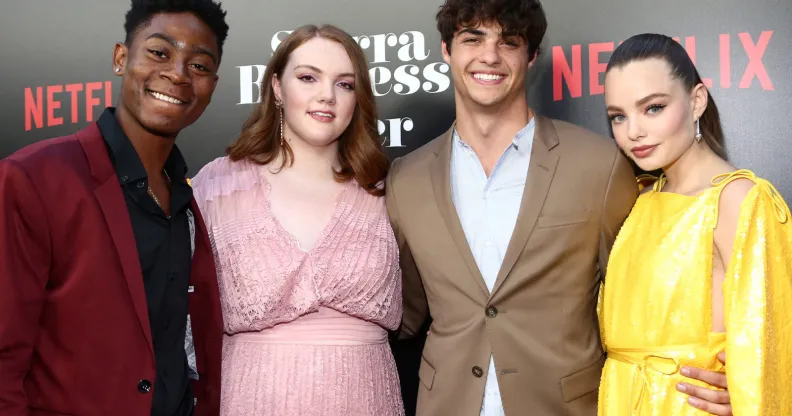Netflix’s Sierra Burgess Is a Loser writer responds to accusations of transphobia, homophobia

HOLLYWOOD, CA – AUGUST 30: RJ Cyler, Shannon Purser, Noah Centineo and Kristine Froseth attend the Premiere Of Netflix’s “Sierra Burgess Is A Loser” at ArcLight Hollywood on August 30, 2018 in Hollywood, California. (Photo by Tommaso Boddi/Getty Images)
Netflix’s new film Sierra Burgess Is a Loser has sparked numerous controversies and attempts by screenwriter Lindsey Beer to explain her work have failed to quench the debate.
The teen film aims to be a quirky romantic comedy in which the main character Sierra Burgess, played by Stranger Things actor and body-positive activist Shannon Purser, devises a complex plan to win over heartthrob Jamey, portrayed by gay Twitter crush Noah Centineo, who stars in Netflix’s hit To All the Boys I’ve Ever Loved Before.
And while some viewers have written stellar reviews of the film on social media—Time described it as a “sweet, smart rom-com”—thanking Beer for her portrayal of teen angst and the struggle of self-acceptance, others have voiced concerned over instances of transphobia and homophobia in the film.
In one instance, a character suggests Sierra to write an essay about her “trans experience.” In another, Sierra pretends to be deaf and her friend calls her a “hermaphrodite” to prove she truly can’t hear.
The film, as The Atlantic noted, also offers a problematic understanding of consent. In one scene, Sierra fools Jamey into kissing her.
Several Twitter users have expressed disappointment in the show, accusing it of being homophobic, transphobic and mocking disability and mental illness.

Shannon Purser and Noah Centineo attend the Los Angeles Premiere of the Netflix Film Sierra Burgess is a Loser on August 30, 2018 in Hollywood, California. (Matt Winkelmeyer/Getty for Netflix)
“Sierra burgess is a loser disappointed me. transphobic & homophobic jokes, catfishing and faking a disability is suddenly ‘ok.’ just because you’ve got a hard time fitting in doesn’t mean being a straight up d**k is fine and consent is not a thing anymore. Would not recommend,” Twitter user Faria wrote in a post retweeted more than 3,700 times.
“So one of my close friends’ deaf brother is in Sierra Burgess. When I learned, I was elated. Finally more deaf actors/representation & ASL inclusion in films … Only to find out the deaf character was written and used for a terrible joke,” deaf artist Nyle DiMarco wrote in a Twitter post on Sunday, which has since attracted more than 10,000 likes and 2,400 retweets.
“There were homophobic and transphobic jokes as well,” DiMarco continued, adding: “It is extremely easy to make jokes about marginalised/disfranchised groups … but that makes you a lazy writer.”
Private Apologies
In a private exchange with Twitter user Rudy, who then published screenshots of the messages, Beer wrote that the writing reflected her personal experience.
“People calling me trans, or lesbian, is something I’ve experienced a lot. So while it may just seem like lazy writing, it came from personal experience,” she wrote, before offering her apologies.
“I should have thought about how it may make someone such as yourself feel, and for that I am deeply sorry, as I said. I can’t say it more emphatically, or enough.”

The screenwriter apologised in private to Twitter user Rudy (Rudy @harryshumsbitch/Twitter)
Rudy replied: “Maybe try a public apology,” before adding: “I have had these experiences too. But don’t you dare act like you have the right to toss trans people under the bus because you were bullied in high school. We all were.”
Purser’s Reaction
Speaking to Refinery29 about the controversies surrounding the film, Purser—who is bisexual and a supporter of the LGBT+ community—admitted she wouldn’t say those things in real life, but she has heard others making such remarks.
“These are jokes I don’t make in real life, but they are what I hear coming from young people. To say that something is realistic doesn’t mean that it’s right,” she told the news outlet.
“All of these characters are entering the film from a very self-centered, socially unaware point of view. It’s a story of growth for all of them as the movie goes along,” she added.

In a tweet, Beer discussed her pride in the film’s portrayal of diversity. (Maia @sugarshookie/Twitter)
As for screenwriter Beer, she has deleted her account following the controversy, which likely took her by surprise. In a tweet she wrote on September 5, she expressed her pride in the film’s portrayal of diversity: “Thing I’m most proud about SBIAL is how it embodies its message. Written, produced, & edited by women. Directed & scored by gay men, with a soundtrack featuring a gay duet. Actors of every size, shape, & race. A deaf character played by a DEAF person. Representation matters.”
Regardless of the writer’s intention, it is how she handled the criticism that was most disappointing to some commentators.
“So many amazing writers out there and Lindsey Beers [sic] is the one that gets her transphobic, homophobic, ableist, and extremely lazy screenplay produced, clapping herself on the back for “representation”. Then when she’s asked to do better she disappears.” Twitter user Gabriela wrote on Tuesday, adding: “If the people you’re trying to ‘represent’ are the ones calling you out, maybe it’s time for serious self-reflection, apologising, and taking notes to avoid repeating your mistakes.”

